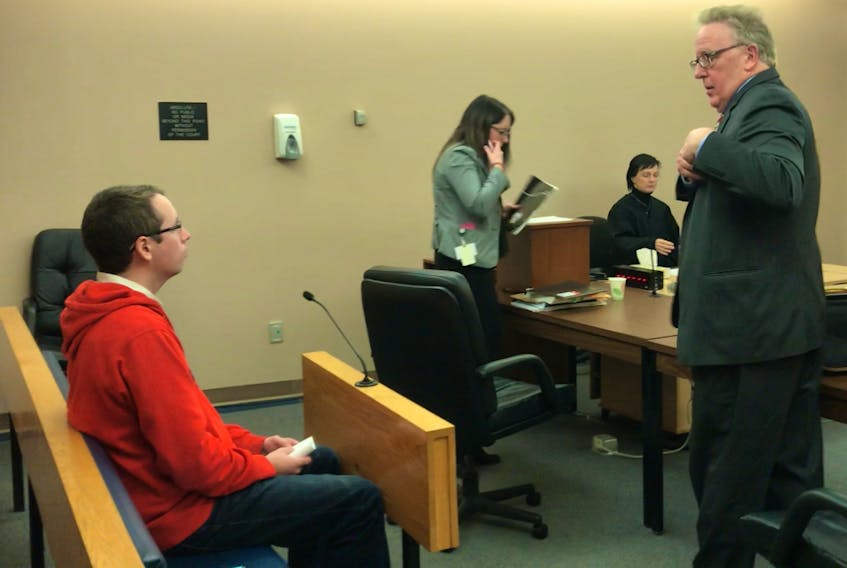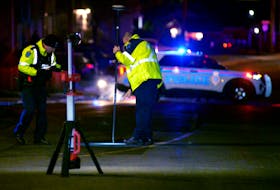ST. JOHN'S, N.L. — He told the court he had known all along that the person with whom he was chatting online wasn’t really a 15-year-old girl, and that he was just trying to investigate the scam so he could expose it.
The judge didn’t buy it, saying Tuesday that Kyle Brown not only believed he was chatting with a child, he gave her personal details, sent her a photo of his penis and discussed payment for various sexual acts.
Not only that, provincial court Judge Colin Flynn noted, Brown was captured on video alone in a room at RNC headquarters during a break in police questioning, saying to himself, “Oh man, what did I do, what did I do, what did I do?”
Flynn convicted Brown, 31, of three charges of child luring for the week-long conversation he had in 2017 with the “girl,” who was actually a male RNC officer.
Brown turned around in his seat in the St. John’s courtroom and said to his mother, “I’m sorry.”
Brown had responded to an ad on a local adult classified site. “New to the scene,” the ad read. “Teen girl involved in dance and cheer, long legs, lean body, can’t host.” The ad included a selfie of a female from the lips down, wearing a bra and panties.
Ten people replied to the ad. Five of them said they weren’t interested after the “girl” told them she was 15 years old. Brown told her if she looked like the photo, he was “absolutely into” her.
Minutes later, Brown initiated a discussion about sexual acts, inquiring about prices. Over the following days, he exchanged sexually explicit messages and at least one photo with the teenager, speaking about payment for sexual acts and the possibility of meeting in person. He was told multiple times of her age, and said he was cool with it.
Upon receiving a phone call from RNC Const. Terry Follett, the investigator behind the covert online operation, Brown promptly turned himself in for questioning.
The banter back and forth indicates his desire to have some form of sexual relations with this person, who he knows is under the age of 16
Testifying at his trial, Brown said he had never believed he was talking to a 15-year-old girl and had been attempting to gather information to expose whoever was behind the online identity as a scammer.
“The continuous communications between Mr. Brown and the fictitious (girl) shows no indication that Mr. Brown knows this is a fictitious person and no indication that his intent is to call out that person for in essence being a fraud. The banter back and forth indicates his desire to have some form of sexual relations with this person, who he knows is under the age of 16,” the judge ruled.
He said the statements Brown gave to police, before he was told the girl was not real, don’t jibe with his testimony in court.
“While he was under no obligation to say anything to the police, he did offer a lot, but nothing as he did in his testimony. The failure to explain his actions at that time causes me to reject the explanation he now gives once he finds out, after the interview, that this was a fictitious person.”
Flynn also rejected Brown’s argument that Follett’s investigation amounted to entrapment, saying the covert operation didn’t meet the legal definition of the term.
Police had no knowledge of Brown’s criminal activity when Follett posted the classified ad, the judge said, and the investigation was a bona fide one, given police had previously laid charges against other people using the same website. Follett was not the aggressor in the text exchanges beyond posting the photo, and most members of the public would likely not have engaged in the conversation Brown did, Flynn ruled.
“In my view, from the evidence presented, an objective member of the community would conclude that the police did not go further than providing an opportunity for Mr. Brown to engage in this type of activity,” Flynn said, “He was not induced, and therefore the case for entrapment is not made out here.”
Each of Brown’s convictions carries a minimum six-month jail sentence, and defence lawyer Derek Hogan indicated he plans to argue that those minimums meet the criteria for cruel and unusual punishment in Brown’s case.
Hogan and prosecutor Erin Matthews will present their submissions to Flynn on April 27.
Twitter: @tara_bradbury









